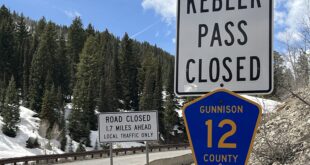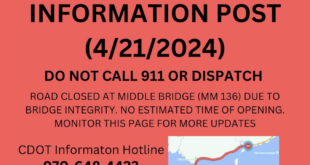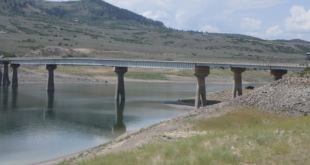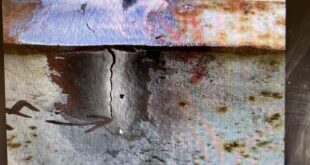Details of a ‘Community Preservation Fee’ still to be worked out
[ By Mark Reaman ]
While actual details of a so-called ‘Community Preservation Fee’ have not been decided or even discussed, the Crested Butte town council on Monday agreed to officially hold a place on the November ballot for voters to consider a new tax on homes not occupied by year-round residents. They also are holding a place for a potential increase in town sales tax. A special meeting to flesh out specifics of the potential new fee has tentatively been scheduled for August 10.
A sometimes vigorous debate over the fee, which some classify as an empty house tax, took place at the July 19 council meeting. Led by Crested Butte finance director Rob Zillioux, town staff is advocating the fee as the best way to raise funds quickly for things like affordable housing, support of locally-owned businesses, arts in the community, open space and climate change projects.
“The community should take the reins of its future,” Zillioux told the council. “People here now want to have the same community the mid-timers were able to have and that is disappearing quickly. Locals should have the opportunity to live here, work here, have a family here. That’s gone from the free market all the way down to CB South. Protecting local businesses is the next stress point and they are big part of the culture here. So are the characters we still have in the community.
“The unintended consequences of growth are smashing us from all sides right now and you can feel the stress of the people in town,” he continued. “Like with the Red Lady fight, this town is going to have to punch above its weight to make a difference. The last time a family with an area median income could aspire to buy a house in town was 2012. Since then wages haven’t kept pace with the increase in real estate prices.”
Zillioux cited the transformation of other resort communities in the West like Moab, Aspen and Jackson, that went from nice communities to “amusement parks for the wealthy.” He said Crested Butte was clearly heading down the same path and the Community Preservation Fee had the ability to thwart that. He advocated for locals to live in Crested Butte citing the fact that if the county’s Whetstone parcel south of town is built out for affordable housing and a significant number of deed restricted units are included in a future North Village subdivision in Mt. Crested Butte, traffic in Crested Butte would begin to mirror the other congested resort communities.
Zillioux’s goal is to have the fee generate $40 million over the next 10 years. “That sounds like a lot of money but it’s not,” he said. “We need that type of real money to do this.”
He argued that second homeowners in town should support the fee since it would help improve their experience when they visit and protect and actually grow their investment. He ended his presentation to the council by reading a passage from the Dr. Seuss book The Lorax.
Town manager Dara MacDonald said given county deadlines, the decision to hold a place on the ballot had to be made at that meeting while details of ballot language could be worked out before the end of August. She indicated the outline of the flat tax ballot language was already written but there were “nuances that need to be discussed and decided on by council.”
“Tonight the decision is not the details but whether to reserve a spot on the ballot to potentially give the people the choice to vote on it,” said councilperson Jasmine Whelan. “The more granular discussion comes later.”
“I appreciate Rob’s presentation,” said councilperson Will Dujardin. “We knew the impacts of STRs and empty homes on the community. This isn’t new. Taxing homes that don’t have people in them can mitigate the impacts. We need to create buy-in to dispel the ‘us versus them’ thing. I think the fee should be simple and be centered on affordable housing. The Community Preservation Fee is something we can all get behind. Our community is at stake.”
“We need money tomorrow,” said Zillioux. “This would allow us to be responsive to opportunities.”
“I’d challenge us to consider a one-percent increase in sales tax,” suggested councilperson Chris Haver. “That would show a willingness of the broader community to participate in the funding and it wouldn’t just be on the Crested Butte second homeowners.”
“I think despite the talk, this is very much an ‘us versus them’ situation,” said mayor Jim Schmidt. “Taxing the hell out of one group doesn’t show a whole lot of love. I think a mill levy is a more fair way to go. We don’t need a vote to raise the property tax five mills and earn a million dollars a year. The town has done a lot with housing for years. I’d like to see the county and Mt. Crested Butte do more for affordable housing and the Whetstone and North Village projects offer that opportunity.”
Schmidt said the flat tax would negatively impact the Crested Butte old timers who still own property in town from the mining days. “A $10,000 a year fee is a lot of money to some people,” he said. “To be clear I agree we need to take action but I disagree with the proposed funding source.”
Schmidt was assured by town attorney John Sullivan that the fee would be defensible if the town was challenged in court and certain exclusions could be allowed.
“It is important to craft this in a way that doesn’t punish people,” said councilperson Mona Merrill. “If it’s not done right it won’t pass on the ballot. Our job is to make the inequality gap between people in town smaller. I like the idea of everyone sharing the burden but I’d like to think we could do this in a loving, compassionate way. It’s staff’s job to present it in a non-inflammatory manner.”
“We need to stop assuming all second homeowners are rich CEOs,” said councilperson Chris Haver. “Not all are. I look at them as regular people.”
The public shares different views
The public spoke both for and against taxing empty homes.
“It’s a democracy and people should be able to vote on taxes bestowed on them,” said Cole Thomas. “Something needs to be on the ballot.”
Brendon Riley owns a trailer in the mobile home park and has been coming to Crested Butte since the 1970s. “I’m not a millionaire or a CEO,” he said. “To put this fee on me in a trailer at the same rate as the multimillion dollar houses across the street on Butte Avenue is not fair. It definitely is an ‘us versus them’ situation. You are calling me something different when you put a tax on me that no one else pays. A lot of people really care about this town. Go to the ones with resources and ask them to pitch in. They’ve proven in the past that they will do so.”
It’s not an attack, it’s an invitation for second homeowners to have a tangible way to help the community,” said Eric Rankin. “I’ve talked to a lot of second homeowners and they get it. I’ve heard positive feedback.”
“Everyone who owns a house here but doesn’t live full time in Crested Butte is getting dumped in the same bucket and that’s not fair,” said Haden Spencer. “It’s inappropriate that every second homeowner is paying the same fee. Circumstances are vastly different between people. I’m a normal person and we are fortunate that our house has been in the family for generations. There is obviously still a ton of conversation needed to figure out the details. Moving ahead with this without details is taking a big risk. There could be a lot of disenfranchised people as a result.”
“I’m not a second homeowner and I agree with the concept but not the route,” said Lisa D’Arrigo. “It really is extremely polarizing. This would be a tax that people have to pay and not everyone is a multi-millionaire. I see the goal but there should be other ways to raise the money. The people this will impact won’t get to vote and the voters wouldn’t have to pay it. There should be ways to make it more equitable”
John Spencer said he had spoke to Valley Housing Fund board members and was asked to gauge interest in raising funds from second homeowners. He indicated that in two hours of initial calls he received positive feedback from four out of five contacts that would be willing to donate six figures to the cause. “Explore less divisive ideas,” he said. “Instead of driving a wedge through the community.”
“Just putting it out there is an attack on second homeowners,” said resident Scott Fulkerson. “If second homeowners can’t vote on it then they don’t really have a voice in it. Even if you don’t mean it to be, it is an ‘us versus them’ thing. This country and this town don’t need more divisiveness.”
“It is a critical issue and exploring all funding mechanisms is important even if the discussion is hard,” commented Odyssey.
“Any initiative that involves preservation of community has my vote,” said Luz LaBoto. “It is ‘us versus them’ for the soul of this town. There are people that want to buy what we have in this town.”
“We need to look at fundraising options,” said Susan Kerns. “We shouldn’t want to divide the community. We need to look at housing in a regional way.”
“The devil will be in the details,” said Margot Levy. “You should consider everything but don’t back away from a solution because it is hard. You need funding sources.”
“It’s not easy and you do have to recognize what Haden did when she organized the Crested Butte Tip Jar site that helped people like me in the service industry during the pandemic,” said Martha Keene. “But holding a space gives the opportunity to put something good together. We need the time to have the conversation.”
“Haden and the CB Tip jar was a huge support mechanism,” agreed Arvin Ramgoolam. “Is there a way to find balance between new people buying in the community as opposed to someone who has owned a house for 20 years?”
“In the ballot language it should take care to exempt people like Haden and Brendon,” said Cole Thomas. “To push you out would destroy what we’re working for. Even if that means we come up with something that raises $1 million instead of $4 million a year it will still help.”
“The bottom line for affordable housing is you need a sustainable, dedicated funding source,” said Jim Starr. “I’ve talked to some second homeowners who support the tax and others that clearly don’t. Perhaps if people donate money to a housing fund they could be exempted for that amount from the tax.”
Town attorney John Sullivan said that idea would have to be investigated to see if it would be legal.
Council willing to talk details
“A dedicated revenue source is important,” said councilperson Jason MacMillan.
“I really would like the staff to come up with other alternatives to the empty house tax,” reiterated Schmidt. “I see this as really divisive but will vote to save a spot on the ballot while we discuss details.”
“The last time it came up, I thought, was awesome,” said councilperson Chris Haver. “But the details ended up not being awesome. What sounds like an easy solution can be tough in the details.”
“We need to consider all the above until they’re shown to be bad ideas,” said Dujardin. “What are people who own houses in town really capable of paying?”
“I think a $7,500 annual fee is too much and would rather see it lower,” said MacMillan. “And I am deeply pensive about losing the trust of the second homeowners in the community.”
“Holding a space now commits us to having a robust conversation” said Whelan. “To Cole’s point, if it pushes people out of the community, no one here wants that on the ballot.”
Council voted 6-0 to reserve a space on the ballot for the Community Preservation Fee with the idea that details will be decided within the next six weeks. At Haver’s suggestion, council voted 5-1 to hold a place on the ballot for an increase in town sales tax to provide funding. Councilperson Mallika Magner was not at the meeting and Dujardin voted against the sales tax idea.
 The Crested Butte News Serving the Gunnison Valley since 1999
The Crested Butte News Serving the Gunnison Valley since 1999





